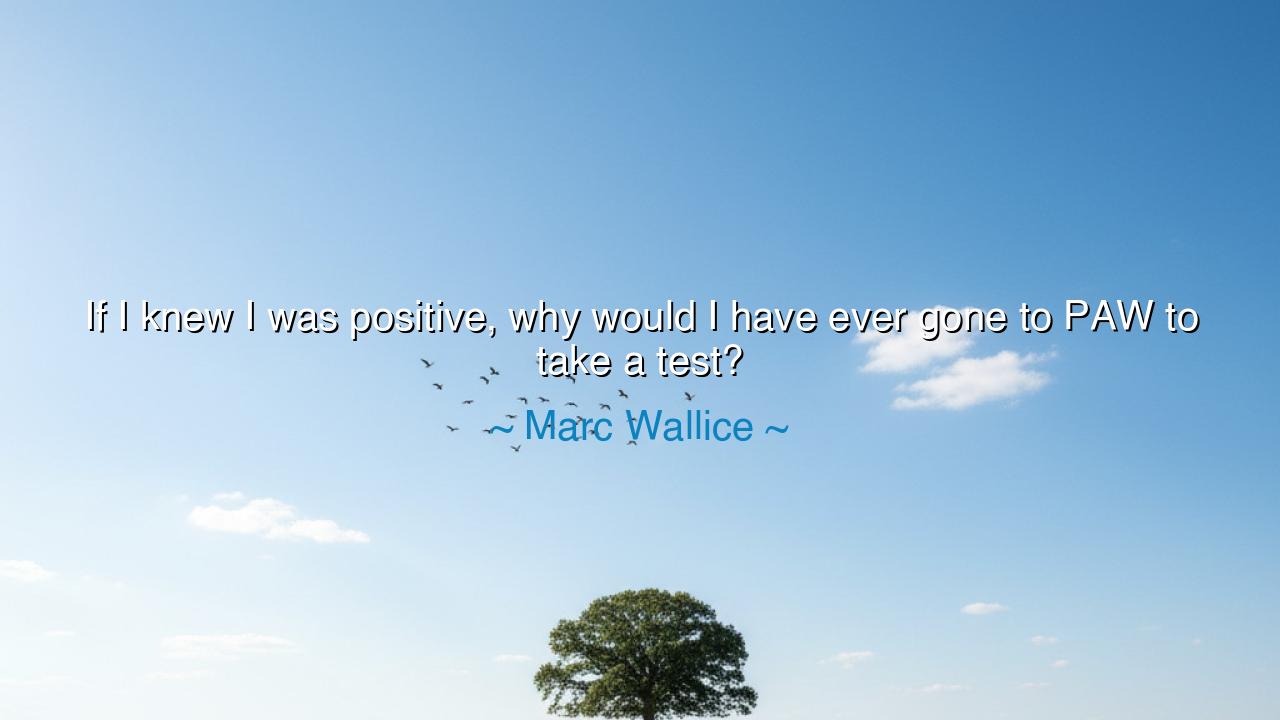
If I knew I was positive, why would I have ever gone to PAW to






Hear the troubled voice of Marc Wallice, who once declared: “If I knew I was positive, why would I have ever gone to PAW to take a test?” These words carry the weight of accusation, denial, and the heavy burden of responsibility. They remind us that in moments of trial, the truth is often contested, and the human heart seeks to defend itself against shame. Yet in their rawness, these words also reveal a deeper lesson—that truth cannot be hidden forever, and that acknowledgment of reality, however painful, is the path toward wisdom and healing.
The word positive here is no light word; it speaks of illness, of consequence, of a stigma that could alter lives. Wallice, accused of spreading harm, sought to defend himself by pointing to logic: why, if he had known his condition, would he have placed himself under the scrutiny of a test? His protest reveals a timeless human tendency—the cry that says, “I would not have chosen this path knowingly.” Whether in health, politics, or morality, mankind often seeks to distance itself from guilt by appealing to reason.
History shows us many such voices. Consider the trial of Socrates, who was accused of corrupting the youth of Athens. His defense was not one of denial, but of reasoned argument: if he had truly sought harm, why would he have lived openly, questioning all in the marketplace, rather than hiding his deeds? Like Wallice’s question, Socrates’ words revealed the conflict between accusation and self-perception, between public judgment and personal truth.
So too in the story of Galileo Galilei, condemned for proclaiming that the earth revolved around the sun. To his judges, he could have said, “If I wished to deceive, why would I publish my findings for all to read?” His reasoning, like Wallice’s, points to the idea that openness is inconsistent with deliberate harm. And yet, as history teaches, perception and intent often diverge, and truth is rarely simple.
The meaning of Wallice’s words is not only bound to his own life but stretches into a universal teaching: when faced with grave accusation, humans will cling to logic, reason, and motive as shields. Yet the deeper lesson is this: knowledge of the self, acknowledgment of truth, and accountability are more powerful than denial. Whether one is guilty or innocent, the heart must wrestle not only with the judgment of others but with its own conscience.
The lesson for us is clear: in times of accusation, do not flee into denial alone. Seek truth first within yourself. If you are innocent, truth will be your strongest defender. If you are guilty, only acknowledgment and repentance can begin the path to healing. To protest endlessly without reflection is to remain trapped in the cycle of blame and defense, never reaching peace.
Practical wisdom calls us to three acts. First, face your tests—be they of health, character, or spirit—with courage, for only truth can set you free. Second, in moments of conflict, do not argue only from reason, but from honesty, for the soul knows when it speaks falsely. Third, live in such a way that your actions need no defense, that your integrity itself becomes proof against accusation. In this way, you walk the path of honor.
So let it be remembered: the cry of “If I knew…” is the cry of many who stand accused in this world. But the higher path is not to dwell in hypotheticals, but to face reality, however harsh, and to let truth shape a better future. Marc Wallice’s words stand as a cautionary tale: denial may serve as a shield, but only truth and accountability can serve as a foundation for lasting peace and redemption.






ATNgo Anh Thu
This comment seems to come from a place of self-defense and reasoning, which makes it thought-provoking. It brings up how people react when their integrity is questioned, especially in matters involving health or responsibility. I can’t help but wonder how much stigma played a role here — whether the pressure to appear innocent or trustworthy might push someone to frame their choices in purely logical terms rather than emotional ones.
MCTruong Minh Chaz
The tone here feels almost rhetorical — like he’s frustrated at being misunderstood or unfairly judged. It’s a compelling statement because it raises questions about motive and credibility. I find myself wondering about the situation’s background: was this about reputation, morality, or legal consequences? It also touches on the broader issue of how people handle stigma around illness — often with defensiveness rather than open dialogue.
TDNguyen Thanh Duy
This quote gives me the impression of someone caught in controversy and trying to defend their actions. It’s interesting how he appeals to logic — implying that no one would voluntarily get tested if they already knew the result. Still, I wonder if this argument holds up emotionally. Could denial or fear also lead someone to take that kind of step, even when deep down they suspect the truth?
ATnguyen thi anh thu
I sense a lot of emotion in this line — maybe disbelief or exasperation. It sounds like he’s addressing an accusation that doesn’t align with his logic. But it also brings up an ethical question: should intent matter as much as outcome in situations involving public health? Even if someone didn’t act maliciously, the consequences can still be severe. How do we balance empathy with accountability in such cases?
TKTien Kiem
This statement sounds defensive, but also deeply human — it reflects confusion, frustration, or maybe a plea for fairness. It makes me wonder about the context behind it. Was he accused of knowingly hiding something? The tone suggests he’s trying to prove his innocence. It raises a broader question about trust and transparency: how do we fairly determine intent when it comes to sensitive issues like health disclosure?